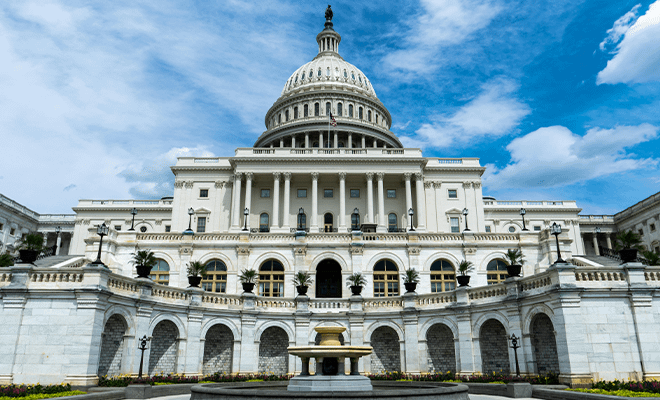Weekly Spotlight
This week sees the perfunctory resignation of top officials across the Biden Administration in preparation for the new Trump team. While these announcements are sometimes ceremonial and at least temporarily rejected, there is not expected to be a lot of carryovers between administrations this time around. Meanwhile, RFK Jr. and others are making their case on Capitol Hill for their confirmations.
News from the JPMorgan Healthcare Conference in San Diego this week suggests that many health care payers who were scheduled to speak, opted out of the appearance after the fatal shooting of a United Health care exec last month. In other news, FDA took action on food labels, nicotine content, and red food dye and CMS announced the next round of drugs up for price negotiations. PBMs and private equity seem to still be drawing the ire of government watchdogs and policy makers. It remains to be seen if Congress will finally have the stomach to step up and act this year. All this while MedPAC met and recommended pay bumps for hospitals and providers while MA plans are cashing in on another raise.
Other Regulatory News
Centers for Medicare and Medicaid Services (CMS)
Drugs and Drug Prices
Eli Lilly urges pause on drug price negotiations
Eli Lilly is leading a push with other pharmaceutical companies to request a pause in the Biden administration’s drug pricing negotiations, and Teva Pharmaceuticals is suing CMS for its implementation of the drug price negotiation program under the Inflation Reduction Act (IRA). Teva claims the program is a “fiction” and “upsets the delicate balance between innovation and affordability,” in its lawsuit.
#Drug, #Patient
Ozempic/Wegovy and 14 Other Drugs Selected for Medicare Price Negotiation
The blockbuster diabetes and weight-loss drug semaglutide (Ozempic, Rybelsus, Wegovy) along with therapies for asthma, cancers, and various other conditions were among the 15 drugs the Biden administration selected for the next ro9und of price negotiations.
https://www.medpagetoday.com/publichealthpolicy/medicare/113822
#Drug, #Patient
Most Medicare Part D enrollees who reach the new $2,000 out-of-pocket spending cap will see substantial savings despite premium changes
An AARP analysis of the Inflation Reduction Act of 2022 found that a majority of Medicare Part D enrollees will see lower total out-of-pocket costs in 2025.
#Patient, #Drug
More CMS
Former Trump FDA, CMS heads lay out how his return could reshape health policy
Scott Gottlieb and Seema Verma, the former heads of the Food and Drug Administration and Centers for Medicare and Medicaid Services, respectively, said that the incoming president and his team could influence which vaccines get recommended and take steps that discourage states from requiring certain vaccines for schoolchildren. The former Trump appointees added that he’ll likely target pharmacy benefit managers, much-maligned middlemen in drug pricing negotiations, and may look for ways to cut costs within Medicaid and Medicare Advantage.
#All
Nearly 15 million fee-for-service Medicare beneficiaries are under accountable care arrangements, the Centers for Medicare and Medicaid Services reported.
Nearly 15 million fee-for-service Medicare beneficiaries are under accountable care arrangements, the Centers for Medicare and Medicaid Services reported.
#Patient
Opinion: Shredding the Medicaid safety net
There is every indication that incoming President Trump and congressional leadership will look to slash federal health care spending — primarily Medicaid — to pay for tax cuts for wealthy Americans.
#Patient, #Payer
CMS retracts Medicare Advantage enrollment report
The Centers for Medicare and Medicaid Services withdrew an eagerly awaited report detailing how health insurance companies fared during the Medicare Advantage annual enrollment period after identifying faults in the data Wednesday.
#Payer, #Patient
Food and Drug Administration (FDA)
Which Foods Have Red Dye No. 3? What to Know About the FDA’s New Ban
What does the science say about its health effects? What foods will be affected? And other common questions about the newly banned additive.
#All
Health and Human Services (HHS)
Congress likely to stall RFK Jr.’s agenda, investors believe
Many Wall Street professionals believe the policy risk in the healthcare sector is lower than feared.
#All
Gilead, government settle HIV drug patent dispute
Gilead Sciences reached a settlement with the Justice Department and HHS that resolves a five-year legal dispute regarding patents for its HIV prevention drugs, Truvada and Descovy.
#Drug
How a Company Makes Millions Off a Hospital Program Meant to Help the Poor
Apexus, a key contractor for the 340B drug pricing program, has come under scrutiny for profiting off its expanding role in the program, which was initially designed to help safety-net hospitals provide discounted drugs to low-income patients, The New York Times reported Jan. 15.
#Hospital, #Drug, #Patient
Federal report highlights private equity, consolidation concerns
Three federal agencies said Wednesday it is clear worries about access to healthcare services and costs have intensified as consolidation and private equity’s role have grown.
#Hospital, #Provider
On the basis of sex: A framework for clinical algorithms
With an approaching federal deadline, healthcare and legal experts have developed a framework for evaluating the use of AI-powered algorithms.
#Patient
Docs Organize Against, and for, RFK Jr.’s Nomination to Run HHS
With controversy continuing to swirl around President-elect Donald Trump’s nomination of Robert F. Kennedy Jr. to serve as HHS secretary, physicians against and in support of the nomination are organizing to try to persuade lawmakers to vote their way.
#Provider
Hill Happenings
The Fiscal Responsibility Act (FRA) in FY2025: Current Status
This week the Congressional Research Service updated its explainer on the two-year budget deal enacted in 2023, including funding limits and spending cuts that would kick in on April 30 if Congress doesn’t wrap up full-year fiscal 2025 bills by then.
#All
Notable Notes
UnitedHealth vows to ease prior authorization amid backlash
“The health system needs to function better,” UnitedHealth Group CEO Andrew Witty said Thursday. In an investor call, he promised full transparency and 100% pass-through rebates for prescription drugs by 2028.
#Payer, #Patient
Four pressing challenges facing Trump’s health regulators as AI makes deeper inroads into medicine
As artificial intelligence evolves and gains new capabilities in health care, it is becoming increasingly difficult to keep tabs on how it’s being used to make decisions about patient care. Hospitals and insurers are adopting applications that may save them time and money, but there is no way to track its impact on patients’ costs and outcomes, or to determine which AI models are subject to government regulation.
#All
NIH issues a policy to widen access to medical products that emerge from government-funded research
After years of prodding, the National Institutes of Health has adopted a new policy requiring companies seeking licenses to sell medical products invented with government research to submit plans for ensuring greater access to patients. Going forward, a company would not only have to submit an access plan when seeking to license the rights to sell a drug, vaccine or device, but would also have to update that plan as product development progresses. And a version of the plan would have to submitted within three months of regulatory approval that the NIH may publish or otherwise make distribute.
Monica Bertagnolli, MD, will step down as director of the National Institutes of Health, having served in the role since November 2023.
#All
FTC slams PBMs for boosting specialty drug prices at the expense of the U.S. health care system
For the second time in less than a year, the Federal Trade Commission released a highly critical report of pharmacy benefit managers, which play a crucial but opaque role in the pharmaceutical supply chain. And the findings may provide further impetus for legislative action to curb practices that critics say contribute to the rising cost of prescription drugs.
#All
JPM 2025: 10 takeaways from the San Francisco conference
The four-day conference drew roughly 8,000 attendees and featured presentations from more than 500 private and public companies.
#All
KFF Health Tracking Poll: Public Weighs Health Care Spending and Other Priorities for Incoming Administration
A majority of individuals, regardless of their political leanings, say the federal government needs to spend more on healthcare programs, according to a KFF Health Tracking Poll released Friday.
#All
Imaging specialist Rebecca Hahn explores key details about the Evoque TTVR device
Rebecca Hahn, MD, discussed key takeaways from the TRISCEND II trial for the Edwards Lifesciences Evoque TTVR valve and shared additional details related to patient selection and implanting the device.
#Device, #Patient
Robotic mitral repair compares favorably to surgery—but some concerns remain
Robotic-assisted mitral valve repair is associated with short-term outcomes comparable to conventional surgery, according to a new analysis of more than 40,000 patients. Robotic treatment also helps patients spend less time in the hospital, but the costs are much higher.
#Device, #Patient, #Provider
Beyond BMI: New report reframes obesity as a spectrum of illness, not just a risk factor
The body mass index is not going away, a new report suggests, but it could be demoted to just a first step in making a more nuanced diagnosis of obesity as a disease, one that distinguishes between what is and isn’t (yet) an illness requiring treatment.
#Patient
Press Ganey launches AI tools to predict safety risks, turnover
Press Ganey is introducing three AI-powered solutions for healthcare leaders in safety, human resources, nursing, patient experience and marketing.
#Patient, Provider
Do Stressed Out Surgeons Have Better or Worse Patient Outcomes?
Surgeons with higher physiological stress in the first 5 minutes of surgery had fewer major surgical complications, a post-hoc analysis of a prospective study found.
#Provider, #Patient
Share via:


